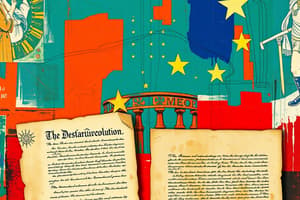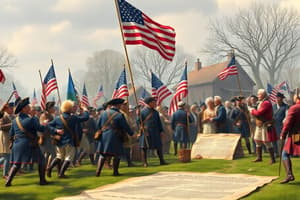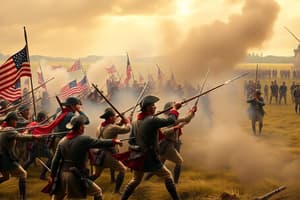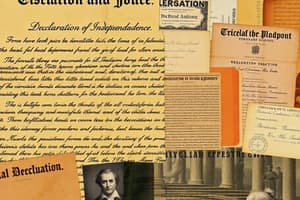Podcast
Questions and Answers
What was one of the main arguments presented in Thomas Jefferson's Declaration of Independence?
What was one of the main arguments presented in Thomas Jefferson's Declaration of Independence?
- The Articles of Confederation should be adopted immediately.
- Governments are created to protect natural rights. (correct)
- Colonists have a right to bear arms against the British.
- Governments are created to infringe upon individual rights.
Which significant action did Congress take regarding slavery in the Declaration of Independence?
Which significant action did Congress take regarding slavery in the Declaration of Independence?
- They affirmed the continuation of slavery in the colonies.
- They ensured a passage condemning slavery was included.
- They decided to ignore the issue entirely.
- They removed a passage condemning slavery. (correct)
What did the Articles of Confederation establish in terms of governance?
What did the Articles of Confederation establish in terms of governance?
- A strong centralized government with a national army.
- An absolute monarchy led by George Washington.
- A direct democracy where all citizens could vote on laws.
- A confederation of separate states with limited powers. (correct)
In what year were the Articles of Confederation put into effect?
In what year were the Articles of Confederation put into effect?
What was a consequence of the inefficiency of the government under the Articles of Confederation?
What was a consequence of the inefficiency of the government under the Articles of Confederation?
Who was appointed the commander of the Continental Army by the Second Continental Congress?
Who was appointed the commander of the Continental Army by the Second Continental Congress?
What event formally recognized the United States as an independent nation?
What event formally recognized the United States as an independent nation?
What was the primary purpose of the constitutional convention in 1787?
What was the primary purpose of the constitutional convention in 1787?
Flashcards
Second Continental Congress
Second Continental Congress
A gathering of representatives from the thirteen colonies that formed in May 1775. This congress appointed George Washington as commander of the Continental Army and played a vital role in the fight for independence.
Declaration of Independence
Declaration of Independence
A document written by Thomas Jefferson in 1776, declaring the thirteen colonies' independence from British rule. It emphasizes natural rights and the justification for rebellion against British tyranny.
Natural Rights
Natural Rights
Rights that all individuals are born with, and which governments cannot take away. These rights include life, liberty, and the pursuit of happiness.
Articles of Confederation
Articles of Confederation
Signup and view all the flashcards
Confederation
Confederation
Signup and view all the flashcards
Constitutional Convention
Constitutional Convention
Signup and view all the flashcards
Ineffective Government
Ineffective Government
Signup and view all the flashcards
Revolution
Revolution
Signup and view all the flashcards
Study Notes
Second Continental Congress
- Patriots called for a Second Continental Congress in May.
- George Washington named commander of the Continental Army.
- Congress proposed a peace treaty to King George.
Declaration of Independence
- Congress formed committees to address tasks.
- Five delegates wrote a declaration of independence.
- Thomas Jefferson drafted the declaration.
- Combined various ideas about rights, life, liberty, and pursuit of happiness.
- Governments established to protect these rights.
- King George violated colonists' rights and freedoms.
- Colonists had to separate from Britain.
- Congress debated Jefferson's points; some points against slavery removed.
- Declaration of Independence approved on July 4, 1776.
Articles of Confederation
- 1781: British troops surrendered.
- Congress approved Articles of Confederation - created a union of states.
- Gave states the power to make decisions, rather than a central government.
Recognition of Independence
- 1783: King George recognized US independence.
- US government struggled to function effectively.
- States often disagreed with each other.
Constitutional Convention
- Revolution ended.
- Work of forming a government began.
- Constitutional Convention in 1787.
Studying That Suits You
Use AI to generate personalized quizzes and flashcards to suit your learning preferences.




